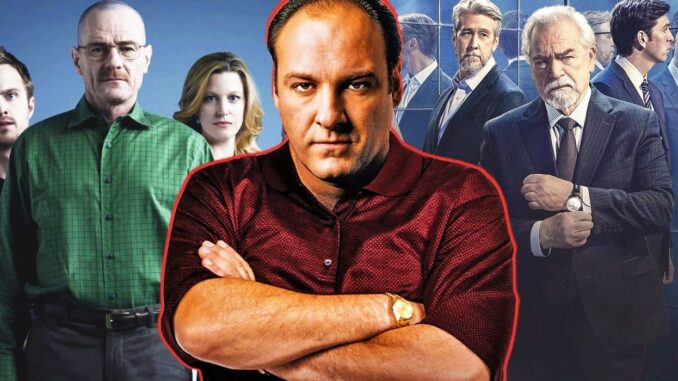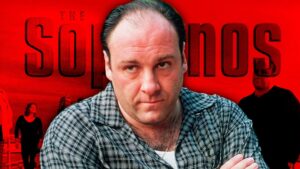
Many people have proclaimed that the golden era of television came to an end when Succession ended with its fourth season in 2023. The HBO series about a wealthy family of misguided children fighting over their father’s business throne reminded people of the age of The Sopranos and Breaking Bad. All three prestige television series have earned their top spots on “best of television” lists for their character studies and brilliant storytelling. There’s also another tiny commonality that all three shows share: they all begin on birthdays.
Birthday episodes are sometimes the trickiest episodes to nail on television. If done wrong, they can retcon a character’s lore and dramatically change the entire show’s timeline in a detrimental way. If done right, birthday episodes can set the stage for a powerful character arc over the entire series’ course. In the case of The Sopranos, Breaking Bad and Succession, they all accomplish the latter. The pilot episode of each of these series begins on a major character’s milestone birthday that oversees a wave of change trampling over the protagonist. Funny enough, by the end of each series, said character experiences the cycle of life when death comes knocking on their front door.
These Three Prestige TV Shows Begin on Milestone Birthdays
Birthdays represent a new chapter in a person’s life, for better or worse. Sometimes, it means becoming an adult or a teenager who will finally experience a taste of freedom and gain independence in one’s life. Other times, the mark of another year passing signifies the closer one is to death. For Breaking Bad, Walter White felt the latter case all too well in Season 1, Episode 1, “Pilot.” The pilot episode has everyone celebrate Walter’s birthday, except for Walter. When Walter’s 50th birthday comes around — a very significant event in one’s life — he feels nothing more than regret and lack of accomplishment.
His job as a chemistry teacher fails to fulfill him since he feels overqualified and underpaid. Having a part-time job at a car wash to make ends meet before his new baby arrives doesn’t instill any confidence either. The only thrill he has on his birthday is his brother-in-law, Hank Schrader, agreeing to let him take a ride-along on a drug bust. Breaking Bad is the only case of these three series where the catalyst birthday is of the protagonist. The Sopranos’ first birthday is for A.J. Soprano, the son of the complicated Mafia member Tony Soprano. A.J.’s 13th birthday splits the double life that Tony lives in New Jersey. In one life, he’s a feared member of the Mafia who’s acting as the underboss of the DiMeo crime family.
In another life, he’s a loving father who supports his children and acts as a father figure for his wife’s first cousin once removed, Christopher. Tony’s two children, Meadow and A.J., are his pride and joy. He goes through great lengths to enroll Meadow in the best college and brags about her to other people. A.J. might not be at the level of success Meadow is, but Tony still holds a protective umbrella over him. A.J.’s future journey as a troubled, underachieving teenager with depression is hard proof why his birthday could’ve been the only one to kick off the series. The age of 13 is the turning point for children to become teenagers, and specifically for A.J., a man like his father.
Succession takes a page out of The Sopranos’ book by kicking off with the birthday of a protagonist’s relative. While Succession has more of an ensemble cast than Breaking Bad and The Sopranos, Kendall Roy is the honorary protagonist. In Season 1, Episode 1, “Celebration,” he celebrates his father, Logan Roy’s, 80th birthday with his siblings. The event unites the siblings, who are all remarkably different in style and attitude. Kendall, the expected heir, spends the birthday sulking over his father staying as head of the company. Roman laughs over his brother’s defeat and rips up a million dollar check in front of a child. Shiv, the only daughter, proudly promotes herself as the “one who got out” thanks to her political career. Finally, no one can forget about the half-brother Connor, who tries to impress his father, who is worth billions, with a sourdough starter.
The Celebrations Represent New Eras for Characters

For the three protagonists of these prestige shows — Walter White, Tony Soprano and Kendall Roy — these birthdays are supposed to be celebrations on the surface. Walter is entering a new stage of his life as he turns 50, Tony’s last child is exiting childhood and Kendall is groomed to be the new CEO of Waystar RoyCo. But life throws curveballs at the worst moments. Every protagonist receives bad news or undergoes an existential crisis that symbolizes the double-edged sword of life. How the protagonists respond to these dilemmas molds a new era.
The day after his birthday, Walter receives a cancer diagnosis that is inoperable. With only two years to live and little money to leave his family, Walter starts cooking crystal meth with his former student, Jesse Pinkman, to secure his family’s financial future. What started as a fallacious but meaningful operation spiraled into a power-driven empire over five seasons. Walter’s initial intentions to save his family from financial ruin faded when he found a new purpose he never had before his 50th birthday: becoming a kingpin drug trade figure known as “Heisenberg.” As he told his wife, Skyler, at the end of the series, his involvement in the drug industry evolved into a desire, not a necessity: “I did it for me. I liked it. I was good at it. And I was really… I was alive.”
Tony Soprano’s crisis came from the instability of his life. In the first season of The Sopranos, his mother was slipping away from him, tension was increasing between his wife and daughter and his uncle was conspiring behind his back. The only thing that gave him comfort in his abnormal life was a family of ducks that resided in his pool. When the ducks took flight, the panic attacks arrived. Later, his therapist, Dr. Jennifer Melfi pointed out that his sadness about the ducks’ departure was really a fear of losing his family. When children become teenagers, parents have to loosen the leash on them. A.J. turning 13 meant Tony could no longer have a watchful eye on him in this dangerous world. Just as Walter was securing his family’s future, so did Tony by rising up in the mafia world.
Kendall Roy doesn’t have the traditional anti-hero arc that borders on the cusp of a villain. His role as a man seeking the approval of his father makes him appear weaker in comparison to Walter and Tony. But throughout Succession, he channels his father’s thirst for blood by orchestrating several “hits” on Logan to make him seem insufficient to run the company at his old age. It was Logan’s 80th birthday party when Kendall realized he had to play his father’s game in order to beat him. What came out of it was a pathetic and half-hearted attempt at being the next media conglomerate god. Kendall was worshiped, laughed at, spit on and cursed out. Ironically, Kendall continued his father’s legacy by creating a tainted image of himself. He just didn’t get the one thing he changed his entire life for: the company.
Where There’s Life, There’s Also Death

In their pursuit of power, the protagonists became worse versions of themselves. When people want to play god, they end up meeting death halfway. Walter and Tony were targets when they became the most influential top dogs in their respective industries. There was almost always a bounty on their heads, but that was the thrill of living on the edge. There was nothing very tragic about how their fates turned out. Both Walter and Tony danced with death until they couldn’t dance anymore. Nobody was at fault for their deaths except for themselves.
Kendall’s fate is a warped definition of a tragedy. Kendall’s drug addiction unfortunately teetered him on the edge of disaster, and he frequently put himself in dangerous situations that could’ve ended his life. The culmination of his personal and professional failures made him suicidal. Kendall made it easy to root for him when he actively tried to be a better person than his father, like exposing Logan for covering up the cruise ship scandal. But eventually, Kendall fell so deep into a dark hole after Logan’s death in Season 4 that he became irredeemable. The real tragedy was that Kendall had great potential to be a better leader and father than Logan, but burned all his bridges in the process. Without the support of others when he lost the company, Kendall metaphorically “died” and was reborn as a different person who needed to find a new purpose in life.
There’s a circle of life in Breaking Bad, The Sopranos and Succession’s stories. Despite all the protagonists taking back the steering wheel of their life on milestone birthdays, they played too close to death. The underlying point of Walter and Tony’s deaths is pretty clear: starting anew doesn’t require breaking moral codes. For Kendall Roy, the memo is more devastating: are people destined to sip the venom that poisoned their parents? Does breaking the generational cycle always mean good things? Maybe the real point is that one can’t have their birthday cake and eat it too if they’re living on the edge.
